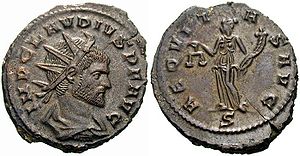
Aequitas
Encyclopedia

Ancient Rome
Ancient Rome was a thriving civilization that grew on the Italian Peninsula as early as the 8th century BC. Located along the Mediterranean Sea and centered on the city of Rome, it expanded to one of the largest empires in the ancient world....
, it could refer to either the legal concept of equity, or fairness between individuals.
Cicero
Cicero
Marcus Tullius Cicero , was a Roman philosopher, statesman, lawyer, political theorist, and Roman constitutionalist. He came from a wealthy municipal family of the equestrian order, and is widely considered one of Rome's greatest orators and prose stylists.He introduced the Romans to the chief...
defined aequitas as "tripartite": the first, he said, pertained to the gods above (ad superos deos) and is equivalent to pietas, religious obligation; the second, to the Manes
Manes
In ancient Roman religion, the Manes or Di Manes are chthonic deities sometimes thought to represent the souls of deceased loved ones. They were associated with the Lares, Genii, and Di Penates as deities that pertained to domestic, local, and personal cult...
, the underworld spirits or spirits of the dead, and was sanctitas, that which is sacred; and the third pertaining to human beings (homines) was iustitia, "justice".
During the Roman Empire
Roman Empire
The Roman Empire was the post-Republican period of the ancient Roman civilization, characterised by an autocratic form of government and large territorial holdings in Europe and around the Mediterranean....
, Aequitas as a divine personification was part of the religious propaganda
Imperial cult (ancient Rome)
The Imperial cult of ancient Rome identified emperors and some members of their families with the divinely sanctioned authority of the Roman State...
of the emperor
Roman Emperor
The Roman emperor was the ruler of the Roman State during the imperial period . The Romans had no single term for the office although at any given time, a given title was associated with the emperor...
, under the name Aequitas Augusti, which also appeared on coins. She is depicted on coins holding a cornucopia
Cornucopia
The cornucopia or horn of plenty is a symbol of abundance and nourishment, commonly a large horn-shaped container overflowing with produce, flowers, nuts, other edibles, or wealth in some form...
and a balance scale (libra), which was more often a symbol of "honest measure" to the Romans than of justice.

